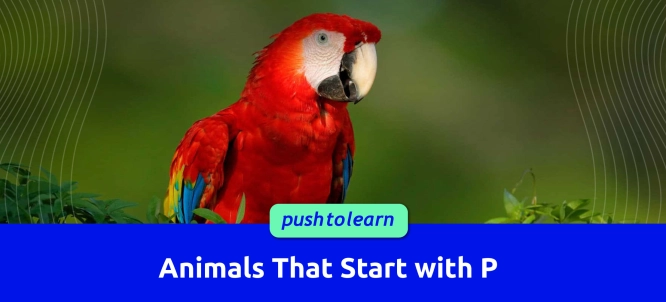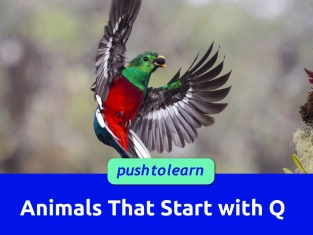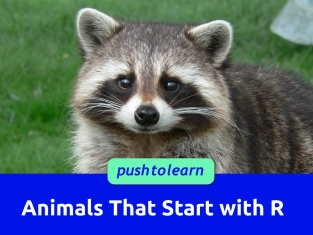by PushtoLearn
Animals That Start with P
Table of Contents
List of Animals That Start with P
|
Animal |
Type |
Where It Lives |
Interesting Fact |
|
Paddlefish |
Fish |
Freshwater Rivers in North America and China |
Paddlefish use their long snouts to detect plankton in the water. |
|
Panda |
Mammal |
Forests of China |
Giant pandas spend up to 14 hours a day eating bamboo. |
|
Pangolin |
Mammal |
Forests and Grasslands of Asia and Africa |
Pangolins are covered in keratin scales, the only mammals with this feature. |
|
Parakeet |
Bird |
Forests and Urban Areas Worldwide |
Parakeets are small, social parrots known for their bright colors. |
|
Parrot |
Bird |
Tropical and Subtropical Regions Worldwide |
Parrots are intelligent birds capable of mimicking human speech. |
|
Peacock |
Bird |
Forests and Grasslands of South Asia |
Male peacocks fan their iridescent tail feathers to attract mates. |
|
Pelican |
Bird |
Coastal and Inland Waters Worldwide |
Pelicans have expandable pouches under their beaks to scoop up fish. |
|
Penguin |
Bird |
Southern Hemisphere, Particularly Antarctica |
Penguins are flightless birds that are excellent swimmers. |
|
Pheasant |
Bird |
Forests and Grasslands of Asia, Europe, and North America |
Male pheasants are known for their colorful plumage. |
|
Pig |
Mammal |
Domesticated Worldwide |
Pigs are highly intelligent and have excellent memories. |
|
Pigeon |
Bird |
Cities and Countrysides Worldwide |
Pigeons can recognize themselves in mirrors, a sign of intelligence. |
|
Piranha |
Fish |
Rivers and Lakes of South America |
Piranhas have sharp teeth and strong jaws, but are not as aggressive as often portrayed. |
|
Platypus |
Mammal |
Rivers of Australia |
Platypuses are one of the few mammals that lay eggs. |
|
Poison Dart Frog |
Amphibian |
Rainforests of Central and South America |
These frogs produce toxins strong enough to deter predators. |
|
Polar Bear |
Mammal |
Arctic Regions |
Polar bears are excellent swimmers, capable of traveling long distances in search of food. |
|
Polecat |
Mammal |
Forests and Grasslands of Europe and Asia |
Polecats are nocturnal hunters with a strong musk scent. |
|
Porcupine |
Mammal |
Forests and Grasslands Worldwide |
Porcupines have quills that serve as a defensive mechanism against predators. |
|
Prairie Dog |
Mammal |
Grasslands of North America |
These burrowing rodents live in complex underground colonies. |
|
Puma |
Mammal |
Forests and Mountains of the Americas |
Also known as mountain lions or cougars, pumas are stealthy predators. |
|
Python |
Reptile |
Forests and Grasslands of Asia, Africa, and Australia |
Pythons are non-venomous snakes that kill prey through constriction. |
Animals that start with P - Flashcards and Exercise
These exercises focus on Animals that start with P

Featured Animals
Paddlefish
Paddlefish, with their distinctive paddle-shaped snouts, are filter feeders that use their sensitive rostrum to detect tiny plankton in murky waters. They are ancient fish species, often referred to as “living fossils.”
Pangolin
Known for their armor-like scales, pangolins roll into a ball to protect themselves from predators. These unique mammals are also insectivores, using their long, sticky tongues to feed on ants and termites.
Poison Dart Frog
These tiny, vibrantly colored frogs are known for their potent toxins. Indigenous peoples of Central and South America historically used their secretions to poison blow darts for hunting.
Polar Bear
Polar bears are the largest land carnivores and are perfectly adapted to the Arctic. Their thick fur and blubber keep them warm, and their large paws help them navigate ice and swim long distances.
Platypus
A marvel of evolution, the platypus combines traits of mammals, birds, and reptiles. Males also have venomous spurs on their hind legs, making them one of the few venomous mammals.
Everyday Use of Animal Names
Some animal names starting with "P" have become idiomatic expressions or symbols:
-
As proud as a peacock: Refers to someone who is overly proud of their appearance or achievements.
-
Pig out: Describes eating excessively or indulgently.
-
Pigeonholed: Means to classify someone or something into a specific category, often unfairly.
Common Errors
Spelling Mistakes
-
Incorrect: "Pinguin" → Correct: "Penguin"
-
Incorrect: "Posion Dart Frog" → Correct: "Poison Dart Frog"
Pronunciation Issues
-
Pangolin: Pronounced as (/ˈpæŋ.gə.lɪn/), not "pan-go-lin."
-
Porcupine: Pronounced as (/ˈpɔːr.kjʊˌpaɪn/), not "por-kyoo-pine."
Using Articles
-
Incorrect: "I saw penguin at the zoo." → Correct: "I saw a penguin at the zoo."
-
Incorrect: "Polar bears is great swimmers." → Correct: "Polar bears are great swimmers."
FAQ
Are piranhas really dangerous to humans?
Piranhas are not as aggressive as often depicted in movies. They primarily feed on fish and scavenged remains, posing little threat to humans unless provoked.
Why do peacocks display their feathers?
Male peacocks fan out their iridescent tail feathers during courtship to attract females, showcasing their health and vitality.
Can a platypus lay eggs?
Yes, the platypus is one of the few egg-laying mammals, along with echidnas.
How do prairie dogs communicate?
Prairie dogs use a sophisticated system of vocalizations, including distinct calls to warn against specific predators.
What is the largest snake in the Python family?
The reticulated python is the longest snake species, capable of growing over 20 feet in length.
Explore other Animals:

